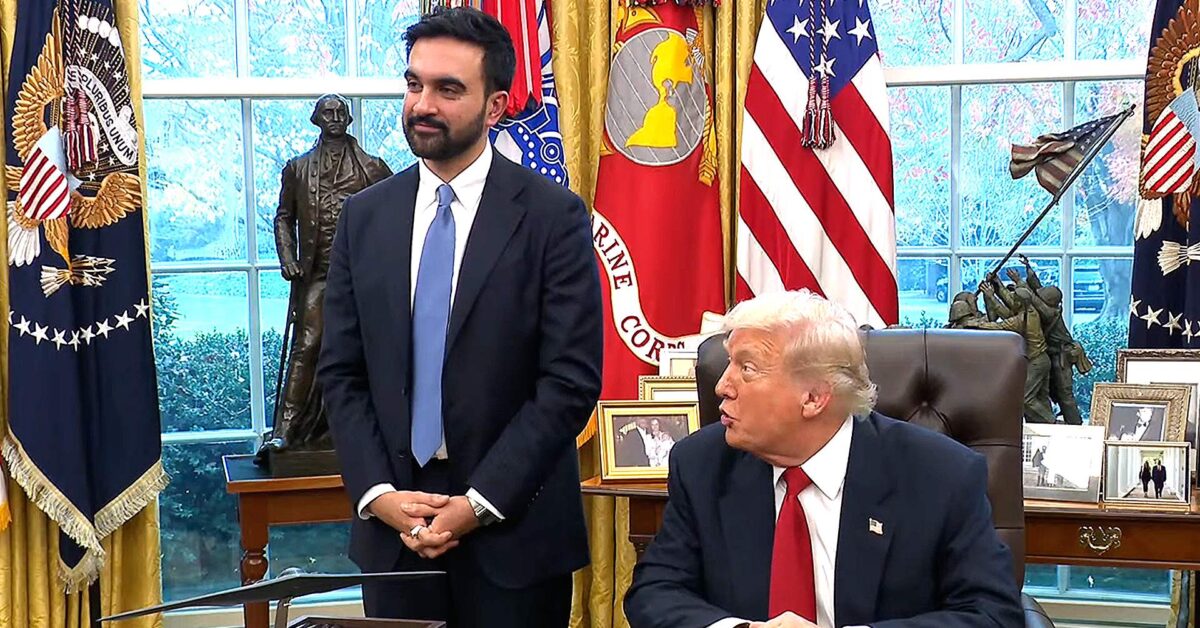Mamdani Went From One-Hit Wonder to Legit Power Player — By Playing Trump Like a Fiddle

The Oval Office gaggle wasn’t supposed to change anything. It was supposed to be content — President Donald Trump and his newly elected progressive foil, each performing the roles cable news has spent months codifying. Conservative media had already settled on its narrative. The White House press corps arrived expecting friction, spectacle, maybe even fireworks.
What they got instead was a different story — not about conflict, but about alignment.
For weeks, I’ve been wrestling with the same question everyone whispered after Mayor-elect Zohran Mamdani’s shocking voting margin: Did New Yorkers vote for the candidate or the agenda? His affordability platform hit the city’s anxieties squarely; the rent crisis has become less an issue than an atmospheric condition. Many admired his rhetorical clarity, his indictment of the city’s skewed priorities. But few argued that his résumé looked anything like that of a ready-made executive.
Then came Friday.
When Trump walked in, the room had the anticipation of a press corps conditioned to recognize the prelude to a fight. But that expectation dissolved almost immediately. Reporters and a raft of cable news viewers tuned in to watch it live quickly realized the real story had unfolded minutes earlier, behind closed doors. The private meeting between Trump and Mamdani, by the president’s own account, was unexpectedly warm — even collaborative. Two populist-leaning figures, each skeptical of institutional drag, had recognized the usefulness of a working relationship.
By the time they stepped in front of cameras, the friction the press had arrived for had already been neutralized.
That off-camera rapport carried directly into the gaggle. Both men took questions about their earlier attacks with a kind of practiced ease — not dodging, not escalating, simply easing past the conflict narrative the media came ready to amplify. The surprise wasn’t Mamdani recalibrating in real time. It was the press discovering that their prewritten storyline didn’t apply. The dynamic wasn’t tense; it was settled.
What the moment also did — almost as an unintended side effect — was detonate months of conservative-media framing. Fox News hosts had dined out on the “socialist mayor” storyline, fed by Trump’s own broadsides, treating Mamdani as a convenient progressive villain. But the instant Trump pivoted from attacking him to pledging cooperation, the narrative collapsed. Fox can’t keep flogging a caricature the Republican standard-bearer has essentially blessed. Overnight, a million talking points evaporated, and the ecosystem that had been primed to mock Mamdani suddenly had nothing left to work with.
Which brings us to the question of what, exactly, happened here.
Some will read Friday as pure opportunism — two politicians doing what was convenient in the moment — but Mamdani’s staffing decisions suggest something far more deliberate and coherent.
Because what distinguishes Mamdani from familiar “hybrid” figures like Gavin Newsom, Pete Buttigieg, or even early Barack Obama isn’t that he mixes populism and competence. It’s how he mixes them. Those figures deployed populism as a campaign accelerant — a mode to be dialed down once governing began, replaced by managerial poise.
Mamdani doesn’t appear to be replacing anything.
He is keeping the populist circuitry live while building technocratic structure on top of it. He’s not shedding movement energy to signal seriousness; he’s using movement energy to power seriousness. Populism isn’t something he dropped at the door. It’s the source of his legitimacy inside it.
“Technocratic populist” is the most accurate label — not someone transcending populism, but someone integrating it into governance.
And the personnel choices that followed the gaggle reinforce the point. Mamdani tapped Dana Rubenstein, a veteran budget director who served under both Bloomberg and de Blasio, to run fiscal policy — a hire that, as one former senior city official told me, “signals he intends to run the place, not just narrate it.” He chose Marisol Clarke, who helped stabilize multiple agencies during COVID, to lead intergovernmental affairs. And Evan Soto-Wright, an urban-planning lifer with deep Albany relationships, is already navigating the state terrain that has undone previous mayors.
This is not a roster meant to mollify the left or appease the right. It’s a roster for governing.
Which is why the Oval Office moment now reads not as a fluke, nor as a lucky break, but as a debut. Not of a reformed ideologue or a closeted moderate — but of something more contemporary: a politician showing that movement authority and executive competence can coexist without canceling each other out.
When we look back on the early days of the Mamdani administration, it won’t be Election Night that marks the beginning. It will be that Friday gaggle — the moment the media realized their conflict narrative no longer applied, and the public got its clearest view yet of a technocratic populist stepping directly into power.
This is an opinion piece. The views expressed in this article are those of just the author.




